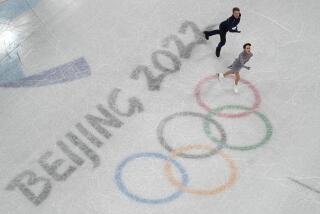Two More Athletes Test Positive for Marijuana
- Share via
Two more cases of marijuana use have been found in drug tests taken at the Winter Olympics, the Games’ top doping official said.
Prince Alexandre de Merode, chairman of the IOC medical commission, refused to identify the athletes or sports involved.
He said that, while the urine samples were collected here, the findings came in spot checks of two labs other than the Nagano Olympic laboratory, the official drug-testing site for the games.
“We have chosen not to publicize them,” he said. “At every Olympics, we have tests sent to laboratories for banned substances. These labs have to provide reliable results in 18 hours. Two of the tests were positive for marijuana.”
The IOC accredit about two dozen drug-testing laboratories around the world.
Canadian snowboarder Ross Rebagliati’s gold medal was withdrawn when he tested positive for the drug last week. His medal was reinstated when an arbitration panel said the IOC had failed to follow its own rules governing drug tests.
Rebagliati claimed the positive finding was a result of second-hand smoke and that he had not used marijuana since last April.
De Merode confirmed reports that higher levels of marijuana were found in earlier tests of Rebagliati’s urine in Canada.
“You’re absolutely correct,” he said. “That case is closed. There is no point in reopening it.”
A working group composed of IOC vice presidents De Merode, Pal Schmitt, Dick Pound and Anita DeFrantz and chaired by IOC President Juan Antonio Samaranch met for the first time Thursday.
The group said “adequate provisions prohibiting the use of marijuana and other socially reprehensible drugs should be adopted at the earliest possible time.”
De Merode is to submit final proposals for such steps at the next IOC meeting in Sydney, Australia.
“We haven’t finalized anything,” he said. “We’re still working on it. We need to take our time. These are sensitive matters.”
*
The U.S. men’s hockey team’s shocking defeat in the quarterfinals of the Dream Tournament has thrown a monkey wrench into CBS’ plans.
The network, which anchored its late-night live hockey coverage around the U.S. team, must show its final three games without the home team and the ratings the Americans would bring.
“This is not like the U.S. basketball Dream Team losing,” CBS spokesman Dana McClintock said.
“We still have the greatest player ever and plenty of other NHL players. It would have been great if the U.S. had won, but we will still continue to feature the games in prime time and late night.”
The U.S. team had generated relatively high ratings for hockey. Its game Sunday night against Canada got a 4.9 rating, the highest-rated network game involving NHL players in at least two decades. Tuesday’s live coverage against the Czech Republic game got a 2.4 rating and a 15 share.
CBS’ next hockey game will be the semifinal between Canada and the Czech Republic on today’s late-night show. The network also will show the bronze-medal game on Friday’s late show and the gold-medal game Saturday night.
While the U.S. women did win the hockey gold, the ratings did not reflect it. The game, shown on a slight tape delay Tuesday morning, got a 3.4 rating and 14 share, 10% higher than CBS’ average on the morning show for the rest of the Olympics.
For those who missed the game, TNT will reshow the third period in its entirety at 2 p.m. PST today.
CBS’ prime-time show also is struggling to attract an audience. Tuesday night’s show, featuring live coverage of the women’s aerials finals, a preview of women’s figure skating and coverage of Japan’s gold medal in the team ski jump, got a 13.5 rating and 21 share. That is 46% lower than the 24.9 rating and 36 share from Lillehammer.
After 12 nights of coverage, CBS is averaging a 16.2 rating and 26 share, 37% behind the 25.8 rating and 39 share from Lillehammer and 14% below the 18.9 rating and 29 share from Albertville.
CBS is on track to post the lowest Winter Olympic ratings since ABC’s 13.5 from Grenoble in 1968.
A rating point for CBS represents 980,000 households, or 1% of the nation’s estimated 98 million TV homes. A share is the percentage of in-use televisions tuned to a given show.
More to Read
Go beyond the scoreboard
Get the latest on L.A.'s teams in the daily Sports Report newsletter.
You may occasionally receive promotional content from the Los Angeles Times.






